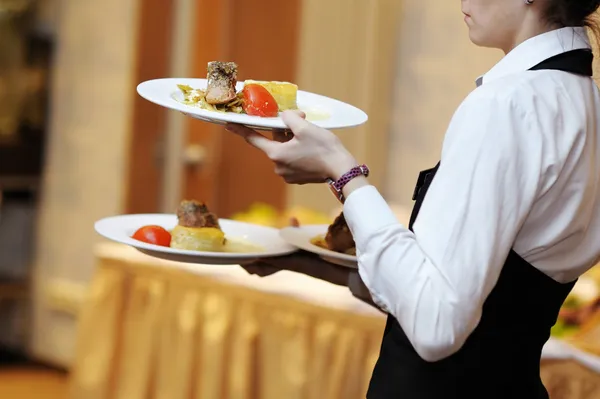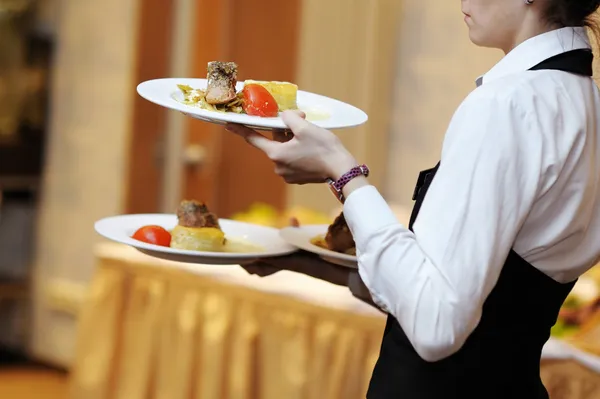least amount required
look at life as a minimalist
give nothing back
as little effort as possibly –
scrape by
(barely)
do the job in it’s barest
infinitesimal effort
with ‘a lick & a promise’
call it good.
(then)
as if putting forth would be a sin
just show up
create the space
(but)
don’t go in.
by Annette Gagliardi
Okay, so this article and the poem are connected in a slight way, or maybe they aren’t. I just think to expect a reward when you have done very little to earn it seems to be the ‘least amount’ you could do. Are current waiters and waitresses doing the ‘least amount required’?
— or maybe they are doing less than required while expecting us to measure up to the highest mark. What’s wrong with this picture?

depositphotos_13726722-stock-photo-waitress-carrying-three-plates-with
My son-in-law talked with me yesterday about the new ‘custom’ of an expected 20% gratuity (tip) at restaurants these days. The price of a meal has gone up, so it takes a really special occasion to afford going out. Then, you may have to pay a sitter. Finally, the cost of a restaurant meal has gone up. Adding a tip means you might need to consider mortgaging the house. In his experience, the 20% tip is kind of insulting.
It used to be that we tipped wait staff because we were impressed with their service. And it was generally only 10%. When I was a waitress, if you wanted a tip, you were extra observant, extra attentive and quick. Above all, you were quick. People tipped you, if they found you competent. Now-days, I question the expectation of a tip if the service is less than desirable. This past week, I got a cup of hot water (for tea) that had lipstick stains on both sides of the cup. As a waitress, I would have noticed this and given it back to the dishwasher. In addition, our table of food was mixed up: someone got eggs they did not order and someone else didn’t get the toast to go with their eggs. There was some confusion about if all the food actually came out and one person didn’t get their food until the rest of us were almost finished.
In defense of the restaurant staff, they did (eventually) get our meal correct and they did give us water, utensils, jelly, more coffee, a check, etc. when we asked for it. But, if wait staff really wants that 20%, customers should not have to ask for any of that – wait staff should be offering it.
Because I waited on tables for five years, I have expectations of my wait staff. I expect — not special treatment, but specific, base-level accommodations; after all, I’m paying for it. I expect the waiter/waitress to greet me within five minutes of my coming into the place. I expect a clean, fresh glass of water and silverware on the table immediately or quite soon. I expect the wait staff to offer menus, and return fairly soon to take my order. I should not have to ask for sugar, creamer, jelly, tea bags, ketchup, or salt & pepper to round out my meal. These items should be on the table or offered in due course. In past experiences, we have had to ask for utensils, wait while our meal got cold and in some cases, just borrow from our neighbor.
It seems to me that current day waiters/waitresses do the least amount required and expect us to tip them the most amount allowed. The idea that wait staff is in need of their tips because the pay is not that much is a limited view. The minimum wage has risen substantially and any tipping should still be above and beyond the wage.

depositphotos_408590622-stock-photo-selective-focus-young-woman-holding
It only makes financial sense that you want customers to exit happy so they will return. If the dining experience is less than stellar, why would people come back? People don’t want to wait for the check when finished eating. A competent waiter/waitress observes that her table of customers has finished eating and brings the bill right over. If the waiter has your credit card, you surely don’t want to wait over five minutes for its return.
Next, the food must be good. And the service needs to make sense. The communication between the wait staff and the kitchen is really important. Why would a cook put my toast one plate, my eggs on another, and my bacon on a third? And if I say no dairy, that is really what needs to come out. I get a gift card every time the cook sends out an omelette with cheese, when I’ve asked specifically for one without. Wait staff must take food allergies seriously. Once I had a waitress say “I don’t believe in that gluten free stuff.” If the waitress doesn’t take my dietary requests seriously, why should I believe in a tip?
Yet, I do tip. I sometimes tip up to 20%. But, that means the wait staff was quick, competent, efficient, polite, smiling (happy to be here) and perhaps friendly. I want them to do the most they can to make my dining experience good. I’m actually rooting for them so I can enjoy the meal and admire their good work.
As a waiter, waitress, doing the least amount required means getting tipped the least amount — maybe 5% — maybe less. At best, getting tipped, but having the customer not come back. What is the least amount required?

Right! Well said!
I was just at a restaurant where the waitress didn’t arrive for almost an hour, took my credit card (to hold!) as she took my order. My food was fine, but I had to ask for utensils and wait (impatiently) for my bill and credit card to come back to me. sheesh.